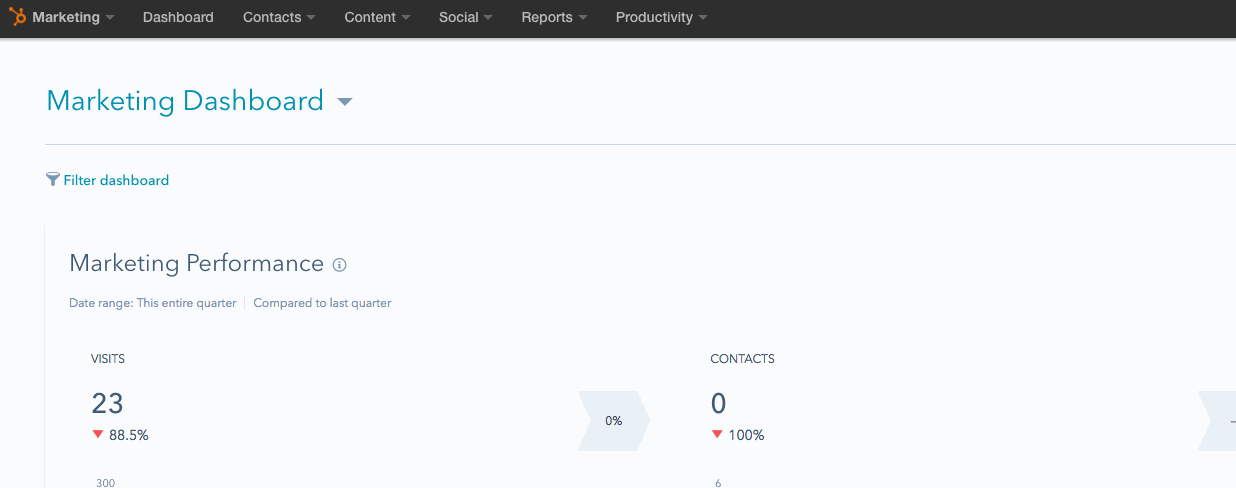A marketing and sales strategy that gives higher ROI, a lower customer acquisition cost (CAC) and a...
Today’s consumers are spoilt for choice when it comes to solutions to soothe their challenges. In response to this, businesses are implementing multiple marketing and sales tactics to draw consumers in. The more choices consumers have, the more tactics businesses will throw into the mix and that means more things for marketers to keep an eye on.
This is where marketing automation platforms can help and there are plenty to choose from. One of the most common faceoffs is HubSpot vs Marketo. Here's a comparison of their features so you can decide which is best for your inbound efforts.

The five main points we're going to discuss are:
Pricing
Marketo consists of seven main modules: lead management, email marketing, consumer marketing, customer-based marketing, mobile marketing, revenue attribution and account-based marketing.
You can purchase these modules individually, as bundles or all together as one fully integrated platform, depending on your business needs.
This means you can create a custom solution, but some businesses may prefer and require a more unified piece of software. Marketo's modules are also priced in tiers, depending on their scale: Select (for smaller companies), Prime, Ultimate and Enterprise.
In contrast, HubSpot is a CRM platform that provides all of its features within a single system - a single source of truth for businesses looking to deepen their relationships with their customers.
As your database grows, you can upgrade your membership and there are some niche bolt-ons you can pay for to enhance your marketing strategies or reports.
HubSpot allows you to use all of their features even at an entry-level basis. Instead of upgrading each individual module, you can upgrade the entire package.
HubSpot offers three product levels at three different prices:
- Starter (the entry-level tier) from £38 a month
- Professional (the middle-tier) from £655 a month
- Enterprise (the most advanced tier) from £2,624 a month
For smaller businesses, HubSpot is certainly the more affordable option as the Starter package is significantly cheaper than Marketo’s Select tier (though the pricing isn't available on their website - you'd have to contact their sales team directly, even if you're only shopping around for the best price).
With HubSpot, there's nothing to hide.
As for HubSpot’s Professional and Enterprise tiers (where you’ll get the most functionality and power if you're a larger customer), these are more comparable in price to Marketo.
However, Marketo is still likely to be more expensive due to the pricing being based on how many modules you require. As most businesses will require more than one module this can drag the costs up.
For example, if you require additional software to accomplish multi-touch revenue attribution in Marketo (using Bizible), it’s a hefty $1,000 a month on top of what you’d already pay for Marketo.
In contrast, HubSpot offers a much more inclusive package. Not only are all of the tools available for seamless functionality, but you also get more for less.
HubSpot is structured around contacts rather than the individual products, so the more contacts you have - the more you pay, rather than paying more to get more products. This allows companies to scale with the product at the right speed.
HubSpot also offers a 14-day free trial and free versions of their software, unlike Marketo.
Smooth user experience
Marketo specialises in providing solutions for enterprises and larger businesses. Their software was built for advanced marketers and often requires more IT knowledge to operate which makes it difficult unless you have dedicated specialists. And even when you have these specialists, it can still be highly time-consuming.
Although Marketo offers a good depth of features similar to HubSpot, this isn’t ideal if you’re new to CRM platforms - since it’s less user-friendly. And it’s important to always keep user experience in mind - as much as you would keep ‘value for money’ in mind.
HubSpot provides a much smoother user experience and allows access to all of the marketing tools you might need at the Professional and Enterprise level, instead of buying separate modules and tools that quickly add up.
And there’s more. Marketo has always been shaped with Enterprises in mind, that’s true. HubSpot used to focus more on SMBs but now with their addition of more powerful, enterprise features they cater to both audiences. This makes HubSpot a great choice because you’ll have the peace of mind of never having to rip out and replace your software due to your growth.
We’ve covered even more reasons to support why HubSpot’s the ideal solution here.
Versatility and range of tools
Marketo offers personalised marketing solutions for specific industries. As we've said previously, they cover seven main modules of marketing which you can buy separately or in bundles to create an automated platform that suits your needs.
While this might mean Marketo provides more in-depth coverage on that specific module (for example, email marketing), it also means you'd end up spending more if you want a fully-integrated platform that has all of the modules included.
In contrast, HubSpot is a powerful CRM platform, offering the ability to create optimised content for blogs, web pages, emails - based on customer data. It allows you to create reports, check analytics and more - all in one place. There’s also the option to integrate up to 1,000 external tools with HubSpot's App Integration Ecosystem if you want to strengthen your marketing muscle even more.

The features available with HubSpot's packages
This is all within one package (Professional and above) while Marketo requires you to buy add-on bundles. This makes HubSpot a much more attractive option to solo marketers, small-medium businesses, as well as larger mid-market enterprise customers who demand more sophisticated, enterprise-power.
HubSpot is also specialised for content production - a feature which Marketo doesn’t offer. You can create dynamic content, manage blogs and use reporting tools and user profiling to continue optimising.
CRM integration
Many businesses tend to look for marketing automation platforms that integrate with their CRM because marketing automation and customer relationship management are closely intertwined.
 Marketo's range of integrations
Marketo's range of integrations
Although Marketo doesn't provide a built-in CRM module, their product was built using the Salesforce platform, meaning they offer some of the best and most innovative Salesforce integrations in the industry. They also provide native integrations for CRM leaders, Microsoft Dynamics and SAP, so marketers aren't losing out by choosing this platform.
HubSpot, on the other hand, is a CRM platform through-and-through and can integrate with popular systems including Salesforce, SugarCRM, Microsoft Dynamics, Zoho and more.
 A snapshot of HubSpot's range of integrations
A snapshot of HubSpot's range of integrations
Marketo's CRM integrations are more advanced and may offer more in-depth coverage, but HubSpot is much more user-friendly because its core function is as a CRM platform. It offers a suite of products that can be built on top of the CRM, combining a unified backend experience with a cohesive user interface so end-users enjoy both power and ease-of-use.
In fact, how HubSpot boasts that their products are already in-built to the platform is one of their strongest and most important differentiators.
Insightful analytics
Successful marketing strategies are fuelled by insights and these valuable insights come from data, which can include information about leads, prospects, customers, content engagement and business deliverables.
A marketing automation solution that doesn't provide data analytics tools is a little more than a robot. They might have lots of fancy tools that provide smooth user experience but if you can't see what aspects of your strategy are working and what aren’t, there's little point.
HubSpot's built-in analytics tool allows you to analyse your website's performance using key metrics and track your marketing funnel all the way from acquisition to close among other features. Better yet, you can access all of this from a single dashboard, making it simple for you to become a data-driven marketer who can make smarter marketing decisions.
After all, HubSpot is a powerful and cohesive CRM platform that can streamline your strategies and improve your results while growing with you.
But what about giving your marketers the credit they deserve? What about understanding the impact your marketing team is having on your revenue?
That's where HubSpot's Multi-Touch Revenue Attribution comes in. With HubSpot's enterprise powerful attribution tool, you can quickly see the impact each marketing activity is having on your business, allowing you to make smarter decisions. Plus, it ensures your marketing team can get the credit they deserve for helping to drive business growth.
And the best part? There isn't a need to buy more software. It's all in one platform, right at your fingertips.
 How to access HubSpot's web analytics dashboard. Image credit
How to access HubSpot's web analytics dashboard. Image credit
The conclusion
Truthfully, there are many reasons why you should use HubSpot and there are many reasons why you should use Marketo.
Both come with their own sets of remarkable features, some which overlap and some which are clearly distinctive. They're designed to automate and optimise your online content so you can carry out your inbound marketing strategies more efficiently and effectively.
Ultimately, your choice will boil down to what your team needs.
Remember, it’s not about how complex the features appear to be. It’s about how easy it is for you to get the information you need.
HubSpot’s Marketing Hubs (in particular, the Professional and Enterprise) are built on exceptional user experience - from the interface to the support team, to the broader ecosystem of products, services and partnerships.
HubSpot’s ease of use doesn’t leave out enterprises either. With features like Multi-Touch Revenue Attribution, account-based marketing and partitioning, HubSpot works for even the most complex use cases. Especially since it's built from the ground up.
In contrast, Marketo struggles in usability. Their tools are powerful, yes, but it often comes at the expense of the user experience. This means you may end up needing to hire a specialised and certified admin - leaving the rest of your team in the dark.
Now, we live and breathe HubSpot, so naturally we’re a little more inclined to prefer HubSpot over anything else. However, we also think honesty is the best policy - so, to read our honest marketing review of HubSpot, click here.
Now, any B2B company worth their salt will be looking for the right marketing automation platform for them - the one that fits their needs, the one their employees find easy to use, the one that provides them with the right data and scalable applications right at their fingertips.
If that applies to you, you’re probably looking for the insights to help you choose the right platform from all the ones on the market today. To help, we’ve got just the guide for you.
The ultimate marketing automation comparison guide
Knowing which marketing automation platform is right for you will go a long way but HubSpot and Marketo aren't the only choices you have. Download our FREE Marketing Automation Comparison Guide which covers HubSpot, Marketo, InfusionSoft and Pardot so you can see which is best suited for your business needs.


